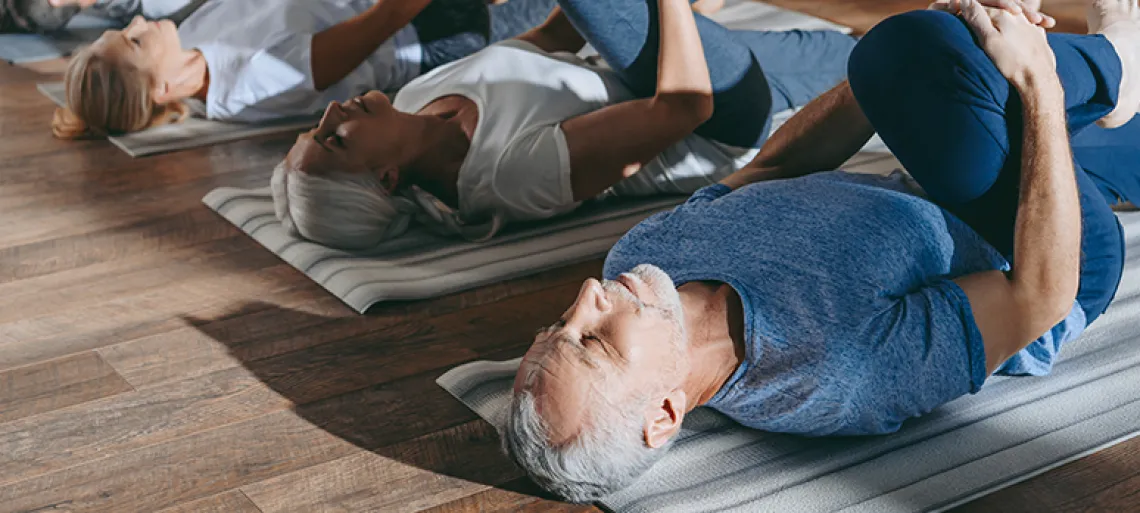June 21 is the International Day of Yoga

On airplanes, they recommend putting on your oxygen mask before helping others because if we can’t care for ourselves, we can hardly help others. Our stress levels get higher as we emphasize the needs of others before ourselves. The more we disregard self-care, the more our ability to care for others and ourselves spirals out of control. Stress becomes burnout, and burnout becomes compassion fatigue when we become so involved that we get sick and hit a wall of physical and emotional exhaustion. A good care plan for family caregiving must include supporting the person receiving care and the caregiver. Yet, focusing on self-care and caregiving, life, and work responsibilities is easier said than done. Yoga for caregivers can address some of our self-care needs and be mindful of our potential for burnout.
Research offers many recommendations to improve physical and mental health and well-being at any age. One recommendation is to find a way to move or engage in some physical activity or body movement that works your muscles and requires more energy than resting. So, our self-care mission (if we choose to accept it) is combining self-care with a form of physical movement or exercise that is preventative, effective, safe, adaptable, cost- and time-effective, and, most importantly, enjoyable. Enter Yoga!
Yoga is the “union of mind, body, and breath.” It is a multifaceted approach to movement that promotes physical, mental, emotional, and energetic well-being. Yoga helps improve strength, balance, and flexibility. A consistent yoga routine may reduce stress and inflammation, promote a healthier heart, and contribute to better sleep and increased energy.
Part of the beauty of practicing yoga is that it can address many different issues simultaneously, especially when yoga's physical and mental aspects are combined. Mindfulness-based yoga designed for caregivers has been shown to reduce stress levels, improve sleep quality, self-awareness, mental clarity, and increase positive emotions. In studies relating to cancer and dementia care, yoga offered the tools needed to practice self-compassion and empowered caregivers to reduce stress in more positive ways. While relieving stress and helping with anxiety and depression symptoms, yoga can also ramp up our resilience skills, which can assist the caregiver in bouncing back from challenging situations. One study found that activities between caregivers and care recipients, such as breathing and “mantras,” decreased pain through body awareness and supported the caregiver relationship.
Yoga is a flexible (no pun intended!) practice tailored to your needs and skill level. Whether you are just learning more as a beginner or want to focus on more advanced approaches, the great thing about yoga is that there are options. Yoga began in India thousands of years ago and has evolved into many forms. Forms of yoga include Hatha, Vinyasa, and Ashtanga. More recently, they have included names of their founders, like Iyengar and Bikram, while others have titles such as gentle, restorative, flow, or power yoga. Differences with these forms of yoga involve the pace of moving from one pose to another, focusing on flexibility and relaxation, or power and strength. This adaptability makes yoga suitable for caregivers of all ages and abilities. A consistent yoga routine can offer the caregiver physical and mental benefits, such as stress reduction, positive emotions, and inner strength. It can also help foster a sense of community and social support among caregivers. Here are some ideas for incorporating yoga into your work and life schedule.
Campus Recreation offers classes such as Gentle Yoga, Power yoga, Vinyasa yoga, yoga for recovery, and paddleboard yoga.
Many yoga programs are available in person at community centers (City of Tucson), fitness centers, and studios that suit your preferences and budget. Classes can be taken virtually through digital platforms, apps, and other options. Virtual platforms are also available specifically for caregivers.
Life and Work Connections offers a great way to track your progress and personal goals (including yoga practice), which is the Arizona Department of Administration (ADOA) state’s HIP program. This points-based program allows you to track your goals and progress with checkups, healthy habits, exercise, and yoga! Based on the points you have acquired from the start of the calendar year, you can earn up to $200 at the end of the year. Another fun university program for exploring and tracking progress with yoga and overall movement is Move Arizona, an 8-week workplace movement initiative that happens every spring.
Yoga may not be the complete “magic wand” to daily stress or caregiving challenges, but it can offer more control, access, and choice for our self-care toolbox. No matter the age, the reason, or the type that we choose, yoga provides the tools we need to improve the quality of life for ourselves and those around us.

